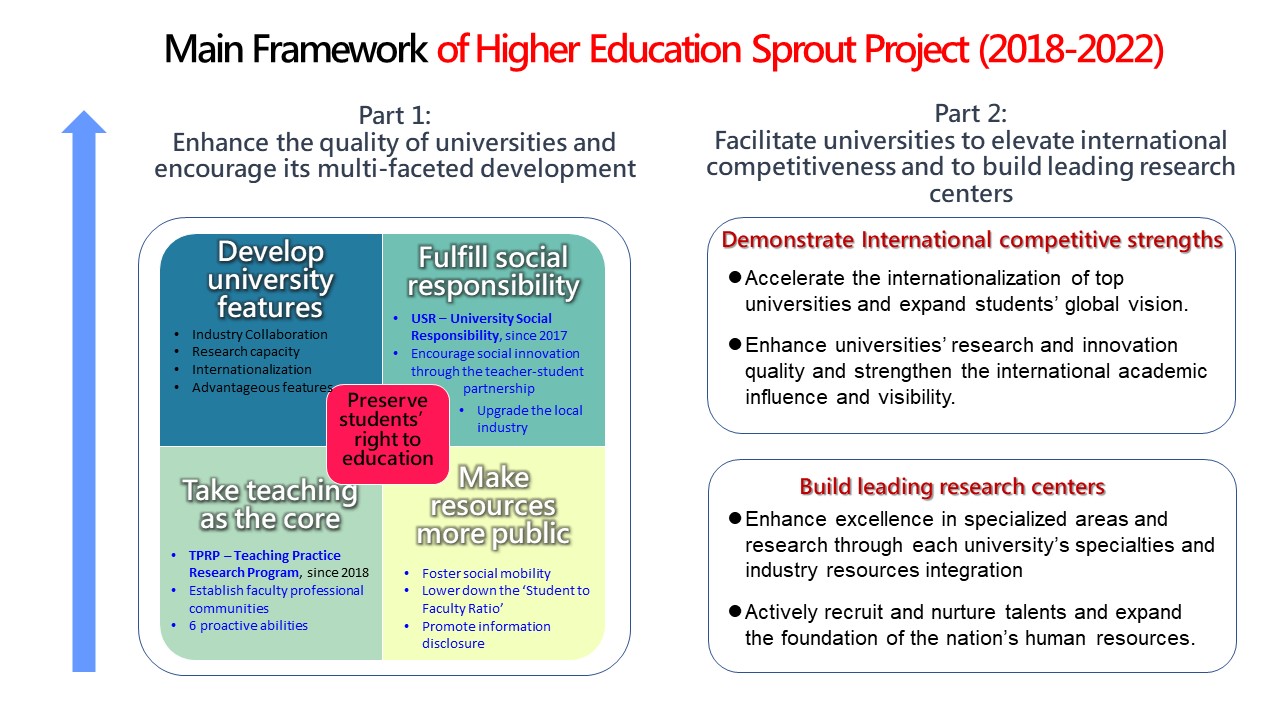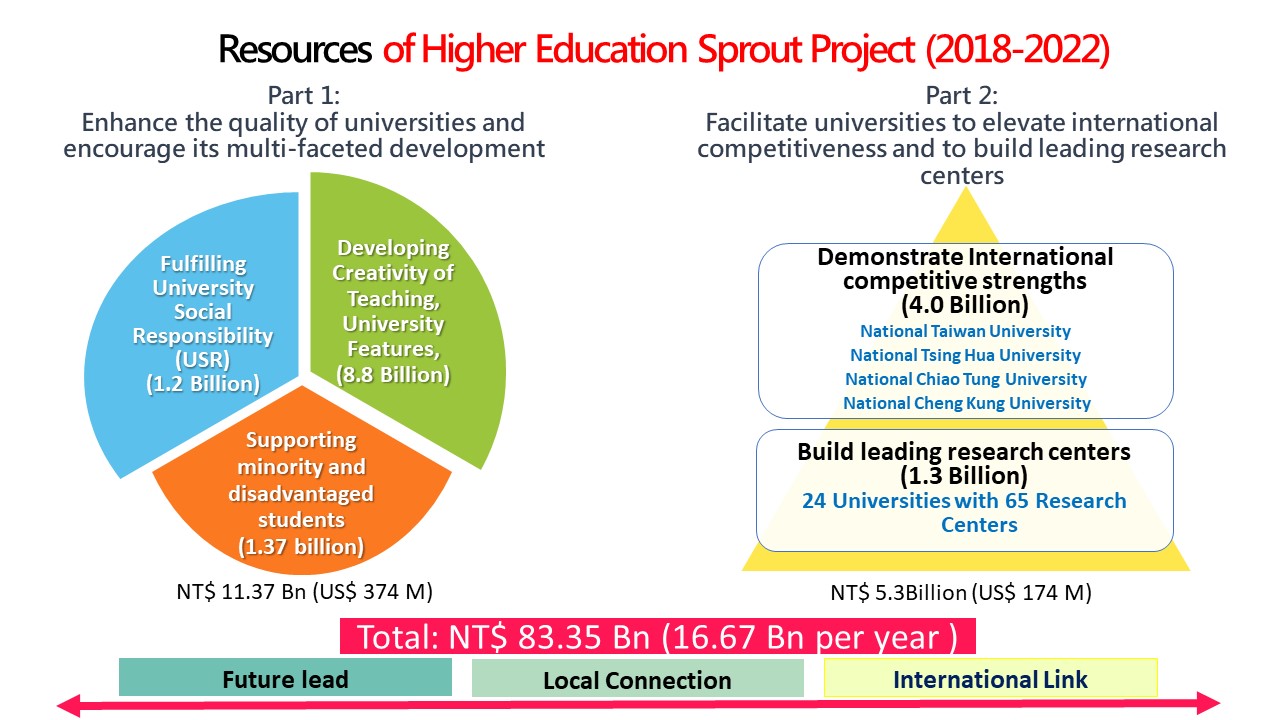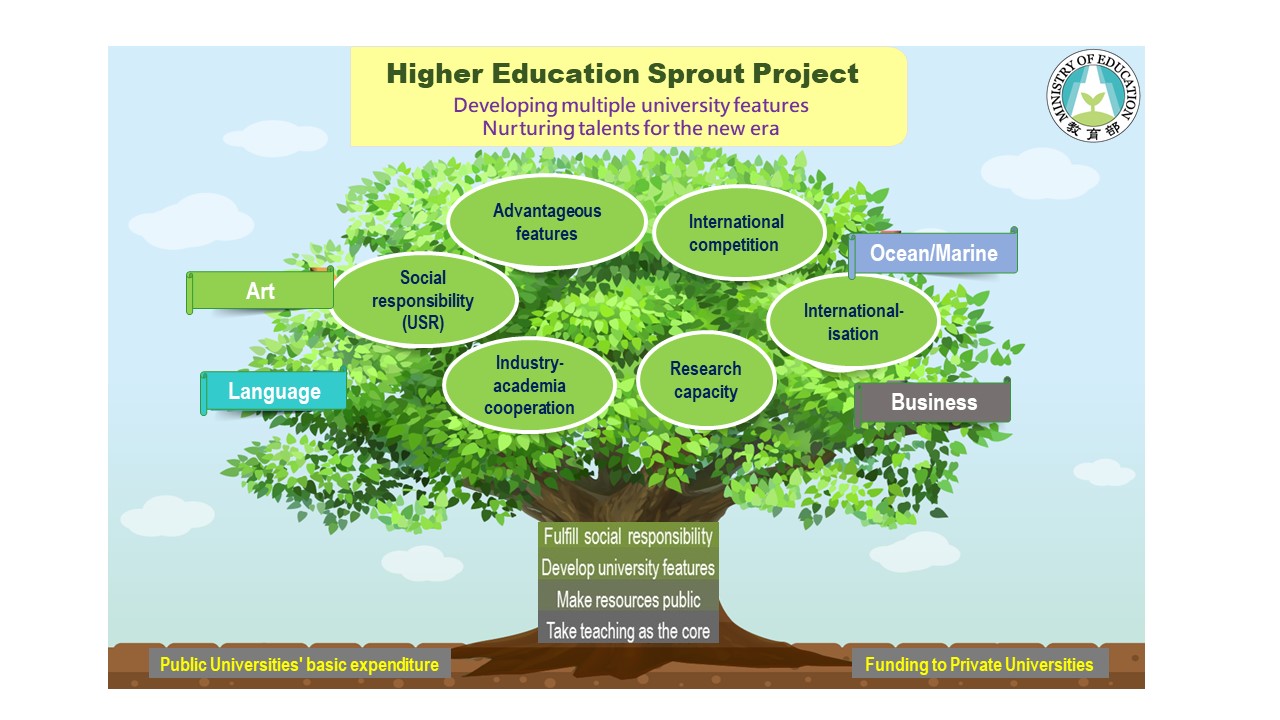Higher Education SPROUT Project
Sustained Progress and Rise of Universities in Taiwan
The Ministry of Education has launched a new project to spur the enhancement of higher education in Taiwan. The project is code named “Sprout”, which is the acronym of “Sustained Progress and Rise of Universities in Taiwan”.
Sprout also symbolizes the beginning of robust growth after seeding of the education foundation.
1. Main Framework
(1)Part 1: Enhance the quality of universities and encourage its multi-faceted development
(2)Part 2: Facilitate universities to elevate international competitiveness and to build leading research centers

2.Resources
(1)Part 1:
i. Developing Creativity of Teaching, University Features (8.8 Billion)
ii. Fulfilling University Social Responsibility (USR) (1.2 Billion)
iii. Supporting minority and disadvantaged students (1.37 Billion)
(2)Part 2:
i. Demonstrate International competitive strengths (4.0 Billion)
ii. Build leading research centers (1.3 Billion)

3. Vision
Developing multiple university features & Nurturing talents for the new era.
4. Project Highlights
Following the first 10 years of the Top University and Excellent Research Center Project and the Program for Promoting Teaching Excellence Universities as well, Taiwan's Ministry of Education will launch a five-year Higher Education Sprout Project (abbreviated as HESP) from 2018, with NT$ 86.85 billion (equivalent to approximately $ 2.9 billion) investment.
The project is divided into two parts, the first part aims to comprehensively enhance the quality of universities and promote the diversification of higher education so as to secure students’ equal right to education. The second part, which aims to reinforce international competitiveness through facilitating universities to achieve world-class status and developing cutting-edge research centers, will cooperate with the Ministry of Science and Technology together with funding support.
(1)The First Part: Reinforce Quality of Universities and Encourage Multi-faceted Development
The contents of the first part will focus on four categories:
i. Taking teaching as the core, aims to raise the willingness of self-learning and lifelong education to cultivate students’ abilities of critical thinking and cooperation for a) finding issues, b) analyzing problems and c) solving problems. For this, we encourage university teachers to innovate teaching methods, establish faculty professional communities, and to conduct practical research on the improvement of instruction and pedagogy.
ii. Making resources more public, focuses on the productivity and effectiveness of the university development through both the establishment of Institutional Research (IR) to self-monitor school performance and accountability and the publication of the relevant information and data of university performance and management. In addition, in order to secure the role of universities as an engine for social mobility, public universities should ensure a fair recruitment policy to increase the percentage of disadvantaged students.
iii. Developing university features, encourages universities to identify their own advantageous areas and strengths so that the whole system of higher education in Taiwan will be of multiple characteristics. The flourish of various aspects, i.e. industry-academia collaboration, internationalization, academic-oriented research capacity, teaching-oriented capacity, or international competitiveness, would make the Taiwanese higher education system more sustainable.
iv. Fulfilling social responsibility, stresses universities’ function as a social innovation facilitator and a nexus of regional industry-academia partnership. Universities are encouraged to take on their social responsibility on the aspects of local caring, and industrial and cultural innovation through teachers and students’ communal involvement within the local development.
(2)The Second Part: Enhance International Competitiveness
The Second Part of the HESP aims to facilitate universities to the sphere of excellence and build leading research centers to reinforce international competitiveness, nurture and actively recruit outstanding talents to empower academic energy, and to promote economic growth, ultimately increasing overall international competitiveness. The Second Part of the HESP is composed of two programs: (1) the Whole-School Program and (2) the Specialized Areas Research Center Program. Both programs seek to encourage Taiwanese universities to increase the international competitiveness, foster international influence and make international contribution through outstanding research and teaching. According to the application requirement for eligible universities, those that meet the requirements could decide which project or both they wish to apply:
i. The Whole-School Program, hereinafter focuses on assisting comprehensive universities with versatile international competitiveness to continuously strengthen international academic influence and visibility from the past accumulated research capacity.
ii. The Featured Areas Research Center Program aims to build leading research centers through each university’s specialty and industry resource integration to establish global leading position, and to encourage universities to propose national development plan as the goal of research management. Please visit the link below: http://hesp-sec.stpi.narl.org.tw/